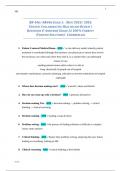1
NR
NR 446/ NR446 EXAM 1: (NEW 2025/ 2026
UPDATE) COLLABORATIVE HEALTHCARE REVIEW |
QUESTIONS & ANSWERS| GRADE A| 100% CORRECT
(VERIFIED SOLUTIONS)- CHAMBERLAIN
1. Patient Centered Medical Home - ANS ✓-a care delivery model whereby patient
treatment is coordinated through their primary care physician to ensure they receive
the necessary care when and where they need it, in a manner they can understand
-future of care
-sending patients home earlier when it is safe to
-keep chronically ill people out of hospital
-preventative maintenance, proactive planning, education to prevent readmission to hospital
-telehealth
2. Where does decision making start? - ANS ✓yourself, values and beliefs
3. How do you come up with a decision? - ANS ✓generate alternatives
4. Decision making Tier - ANS ✓decision making -> problem solving -> critical
thinking -> clinical reasoning
5. Decision making - ANS ✓making a snap decision
6. Problem solving - ANS ✓the process of finding solutions to difficult or complex
issues, some analysis
7. Critical thinking - ANS ✓deeper than problem solving, analyzing the past, future,
looking at everything, looking in 360
8. Clinical reasoning - ANS ✓critical thinking at the bedside
NR 446
, 2
NR
9. Management Functions - ANS ✓planning, organizing, staffing, directing,
controlling
10. Theory X - ANS ✓assumes that workers are basically lazy, error-prone, and
extrinsically motivated by money and, thus, should be directed from above.
11. Theory Y - ANS ✓The assumption that employees like work, are creative, seek
responsibility, and can exercise self-direction. Worker will do a good job.
12. Theory Z - ANS ✓everybody is in right spot, everyone will work together, everyone
trusts what is going on
13. Human Capital - ANS ✓the investment in human knowledge and skills for future
profit
ex: formal educational attainment generally increases human capital because the returns are
in the form of wage, salary, or other compensation.
14. Code of Ethics - ANS ✓written by the ANA(professional organization), tells us how
we should act but is not legally binding
15. Breach of Duty - ANS ✓board of nursing sets standards for reasonable and prudent
behavior, nursing scope of practice
16. decison making - ANS ✓a complex, cognitive process often defined as choosing a
particular course of action.
17. problem solving - ANS ✓part of decision making and is a systematic process that
focuses on analyzing a difficult situation. Problem solving always includes a decision-
making step. Many educators use the terms problem solving and decision making
synonymously, but there is a small, yet important, difference between the two.
Although decision making is the last step in the problem-solving process, it is possible
for decision making to occur without the full analysis required in problem solving.
NR 446
, 3
NR
Because problem solving attempts to identify the root problem in situations, much
time and energy are spent on identifying the real problem.
18. critical thinking - ANS ✓sometimes referred to as reflective thinking, is related to
evaluation and has a broader scope than decision making and problem solving.
19. clinical reasoning - ANS ✓When nurses integrate and apply different types of
knowledge to weigh evidence, critically think about arguments, and reflect on the
process used to arrive at a diagnosis
20. Critical Elements in Decision Making - ANS ✓1. Define objectives clearly
2. Gather data carefully
3. Take the time necessary
4. Generate many alternatives
5. Think logically
6. Choose and act decisively
21. Managers - ANS ✓the organization and coordination of the activities of a business in
order to achieve defined objectives
-Are assigned a position by the organization
-Have a legitimate source of power due to delegated authority that accompanies their position
-Have specific duties and responsibilities they are expected to carry out
-Emphasize control, decision making, decision analysis, and results
-Manipulate people, the environment, money, time, and other resources to achieve the goals
of the organization
-Have a greater formal responsibility and accountability for rationality and control than
leaders
-Direct willing and unwilling subordinates
22. Leader - ANS ✓those individuals who take risks, attempt to achieve shared goals,
and inspire others to action.
-Leaders often do not have delegated authority but obtain their power through other means,
such as influence.
NR 446
, 4
NR
-Leaders have a wider variety of roles than do managers.
-Leaders may or may not be part of the formal organization.
-Leaders focus on group process, information gathering, feedback, and empowering others.
-Leaders emphasize interpersonal relationships.
-Leaders direct willing followers.
-Leaders have goals that may or may not reflect those of the organization.
23. The Management process - ANS ✓planning, organizing, staffing, directing,
controlling
24. Authoritarian - ANS ✓-Strong control is maintained over the work group.
-Others are motivated by coercion.
-Others are directed with commands.
-Communication flows downward.
-Decision making does not involve others.
-Emphasis is on difference in status ("I" and "you").
-Criticism is punitive.
25. Laissez-faire - ANS ✓-Takes a hands-off approach.
-Is permissive, with little or no control.
-Motivates by support when requested by the group or individuals.
-Provides little or no direction.
-Uses upward and downward communication between members of the group.
-Disperses decision making throughout the group.
-Places emphasis on the group.
-Does not criticize.
26. Democratic - ANS ✓-Less control is maintained.
-Economic and ego awards are used to motivate.
-Others are directed through suggestions and guidance.
-Communication flows up and down.
-Decision making involves others.
-Emphasis is on "we" rather than I and you.
NR 446




